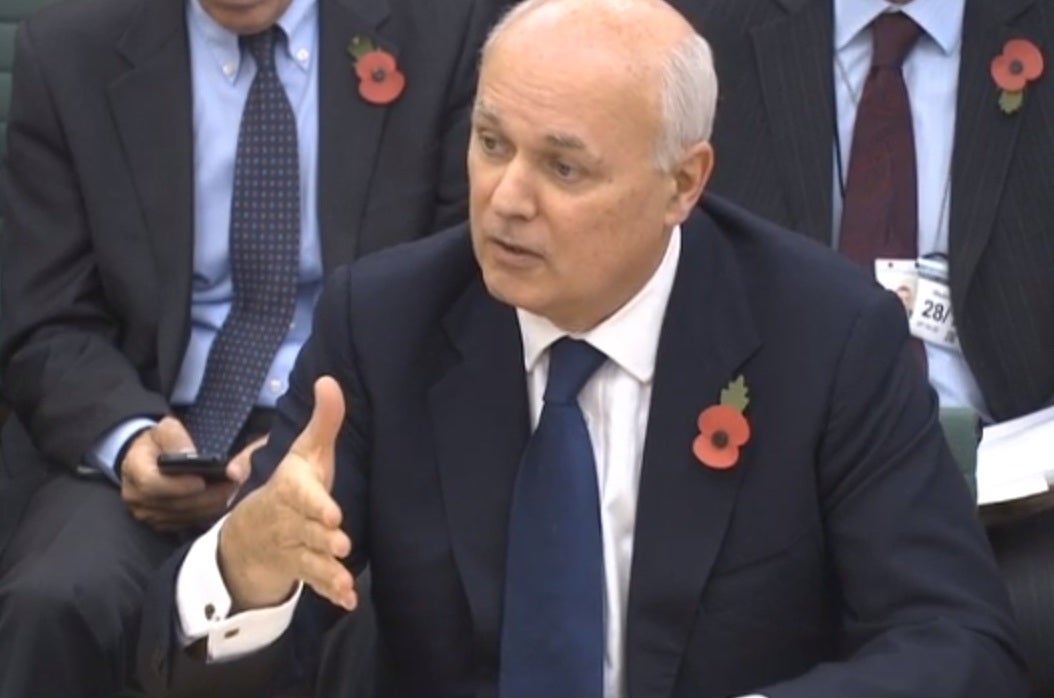Your support helps us to tell the story
From reproductive rights to climate change to Big Tech, The Independent is on the ground when the story is developing. Whether it's investigating the financials of Elon Musk's pro-Trump PAC or producing our latest documentary, 'The A Word', which shines a light on the American women fighting for reproductive rights, we know how important it is to parse out the facts from the messaging.
At such a critical moment in US history, we need reporters on the ground. Your donation allows us to keep sending journalists to speak to both sides of the story.
The Independent is trusted by Americans across the entire political spectrum. And unlike many other quality news outlets, we choose not to lock Americans out of our reporting and analysis with paywalls. We believe quality journalism should be available to everyone, paid for by those who can afford it.
Your support makes all the difference.The benefits sanctions system is working the way it is supposed to, the Work and Pensions Secretary has said.
Iain Duncan Smith told MPs on the Work and Pensions Select Committee that the temporary benefit cuts were also fair.
“We don’t have an internal concern that these are being applied in any way, I hope, other than fairly,” he said.
“Sanctions have been part of the benefit system for some time, under the last Labour government they were accepted as part of the benefit system.
“We do believe that the advisors apply sanctions in the way that they’re meant to do.”
The claim comes despite a warning from the same committee of MPs in March this year that the policy might be just about punishing the unemployed.
“We believe that it is important that the Government conduct evaluations to enhance the evidence base in this policy area, to demonstrate that the use of sanctions is not purely punitive,” the committee's report said at the time.
In 2014 the DWP released figures which showed that 58 per cent of people seeking to overturn sanctions were successful – up from 20 per cent before 2010.
In fact, the Department for Work and Pensions announced in the last week that it would change some aspects of the sanctions system – partly in response to criticisms in the March report.
People will, on a trial basis, be given a 14 day period to provide evidence of why a sanction is not deserved before the monetary penalty is applied.
Claimants can have their social security payments stopped for reasons including missing jobcentre appointments or failing to look for work.
In practice, however, many sanction decisions are perceived to be unfair. Widely-criticised decisions include people being sanctioned for missing jobcentre appointments because they had to attend a job interview, or people sanctioned for not looking for work because they had already secured a job due to start in a week’s time.
In one case a man with heart problems was sanctioned because he had a heart attack during a disability benefits assessment and thus failed to complete the assessment.
In August the DWP was caught making up quotes from supposed “benefit claimants” saying that sanctions had actually helped them.
The Department later admitted the quotes were fabricated and withdrew the leaflet, claiming they were for “illustrative purposes only”.
Sanctions have been associated with highly problematic rises in poverty and deprivation.
A report by a coalition of churches released this spring found that 100,000 children in Britain were going hungry after their parents were sanctioned.
Meanwhile the homelessness charity Crisis has branded the policy "cruel" and says it increases homelessness.
Campaigners, including the Scottish National Party, have called for the sanctions system to be completely suspended.
The charity Citizen’s Advice warned that the DWP’s recent changes to the sanctions system did not go far enough.

Join our commenting forum
Join thought-provoking conversations, follow other Independent readers and see their replies
Comments